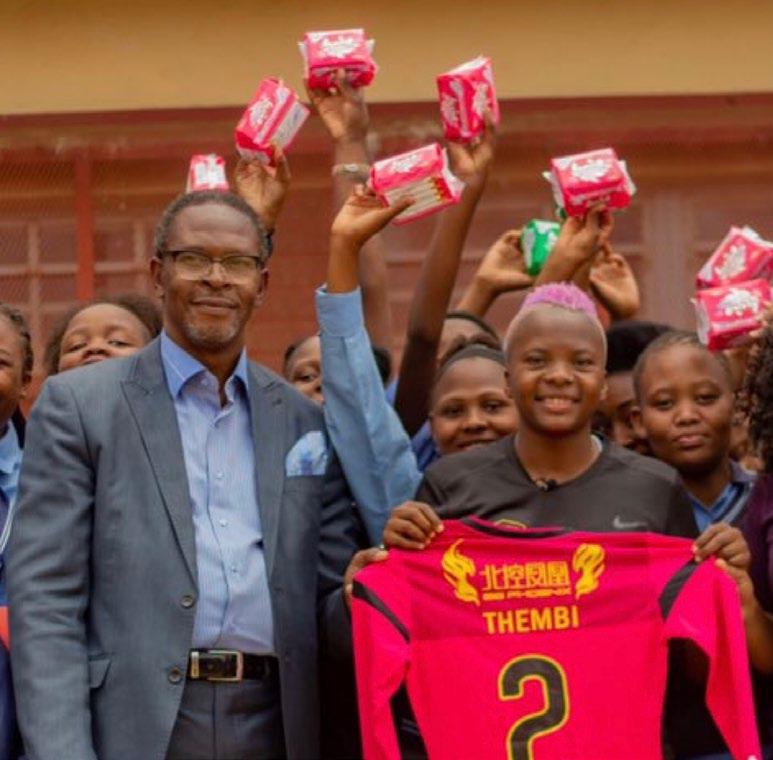
4 minute read
WOMEN OF WONDER
Making it big has enabled UWC’s top female athletes help tackle issues close to home — and their hearts
By Aphiwe Kani
It takes a great deal of time, discipline and commitment to become a professional athlete. For female athletes, additional grit is needed to succeed in maledominated sports such as rugby and football.
These are things that international football player Thembi Kgatlana (25) and Babalwa Latsha (27), the first and only African women’s rugby player to go professional, know.
The University of the Western Cape (UWC) alumni are now using their resources and positions as international, high-performance athletes to tackle serious off-field problems in society, particularly in the communities they hail from. One of the biggest problems they are focusing on is the lack of access girls from low-income communities and disadvantaged backgrounds have to sanitary pads.
Kgatlana is the founder of the Thembi Kgatlana Foundation, which she launched in 2016 in Mohlakeng, Gauteng. The Buy A Girl A Pad campaign allows the foundation to provide sanitary pads to girls from disadvantaged communities who cannot afford to buy any for themselves. The foundation also focuses on providing school uniforms to learners and stationery for schools in the townships.
“The premise of the foundation is to empower young girls who are interested in sports, particularly football. We want to change the mindset within our communities that football is not only for boys but that girls can play, too.
“We also introduce them to coaches from national teams to mentor some of the girls, which gives them hope that they also can accomplish their goals and dreams.”
Latsha, who graduated from UWC with a Bachelor of Laws (LLB) degree in 2019, is using her legal knowledge and skills in the non-profit sector now. “I always wanted to be a lawyer and did not really see sports as a career but more as a hobby. I wanted to be this champion of justice, a human rights activist, and fight for gender equality.”
In her current role, she is doing exactly that.
“While I may not be litigating in court or pleading a case, my journey has taken me into the non-profit sector. I am currently a director of the Menstruation Foundation, an organisation whose sole purpose is to fight period poverty.”

The organisation provides sanitary products to girl learners, and Latsha firmly believes that no girl child should miss school or sport because they do not have access to sanitary products. “We have launched free pad vending machines, placed in several schools around the Western Cape first, with the aim of expanding to the rest of South Africa. A girl is given a free token that she drops into the vending machine. With a pull of a lever, she’ll have access to a pack of pads when she needs it,” she explains.
Both Kgatlana and Latsha grew up in townships and are aware of the hardships that many youngsters, girls in particular, face in low-income communities.
Today Kgatlana is a member of South Africa’s national women’s team, Banyana Banyana, but also holds many other accolades. Amongst these are being one of two South African women ever to be awarded the African Women Footballer of the Year Award by the Confederation of African Football (CAF), receiving the Player of the Season title from the UWC Football Awards in 2015 and 2017, as well as being selected as Woman Sports Star of the Year in 2017 by the UWC Sport Awards.
“The biggest highlight in my career has been signing with international football team Atletico Madrid in July. The opportunity came when I was still with SD Eibar and we played against Atletico in Spain. I really gave them a tough time on the field, which led to their decision to offer me a contract.”
She has since published a book called Strike A Rock: The Thembi Kgatlana Story, that she started writing during lockdown in Portugal.
“The inspiration behind this book was sparked by the hardships I have endured in my life that people don’t know about. I was so tired of being interviewed on different platforms about only the highs in my career so in the book, I pour my heart out and tell it all,” says Kgatlana.
“Through this book, people can know that I am strong because of everything I went through. What I have achieved so far is something that anyone can achieve if they have the heart and the mind for it.”
Latsha is currently serving as vice-captain of the Springbok Women, the South Africa women’s national rugby team. She was also recently selected as a panel member for Rugby Africa’s Media and Photography Awards alongside the Springbok men’s rugby players Makazole Mapimpi and Tendai Mtawarira, and as a brand ambassador for the Laureus Sport For Good Foundation South Africa. She is also a board member of O Grace Land, a girls’ home that focuses on transitioning girls from foster care into adulthood.
While they are admired and celebrated for their sporting skills and the contributions they have made to promote gender equality in rugby and football, it is Kgatlana’s words that sum up both their goals: “I want people to also remember that I was a human being who helped and cared for others first”.











